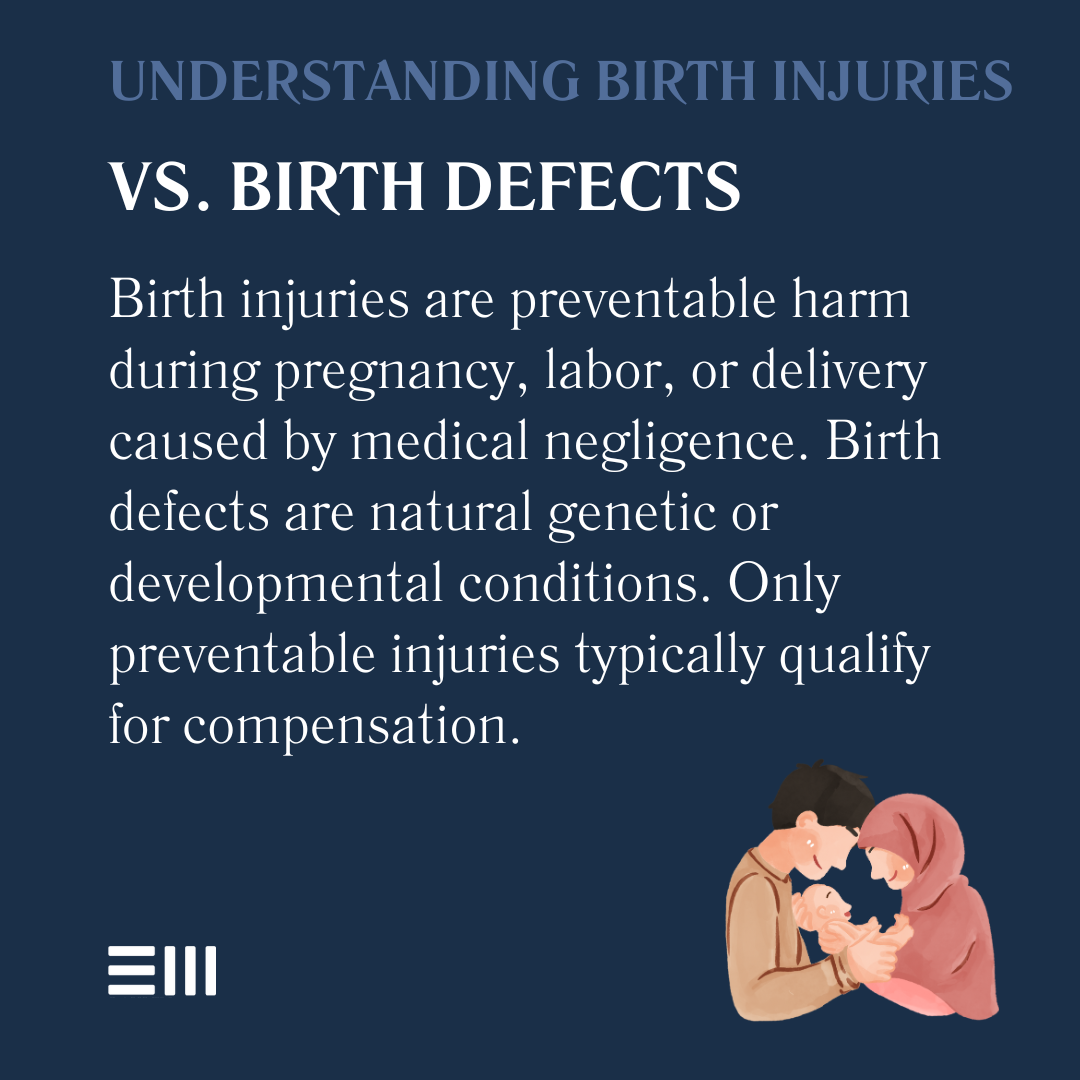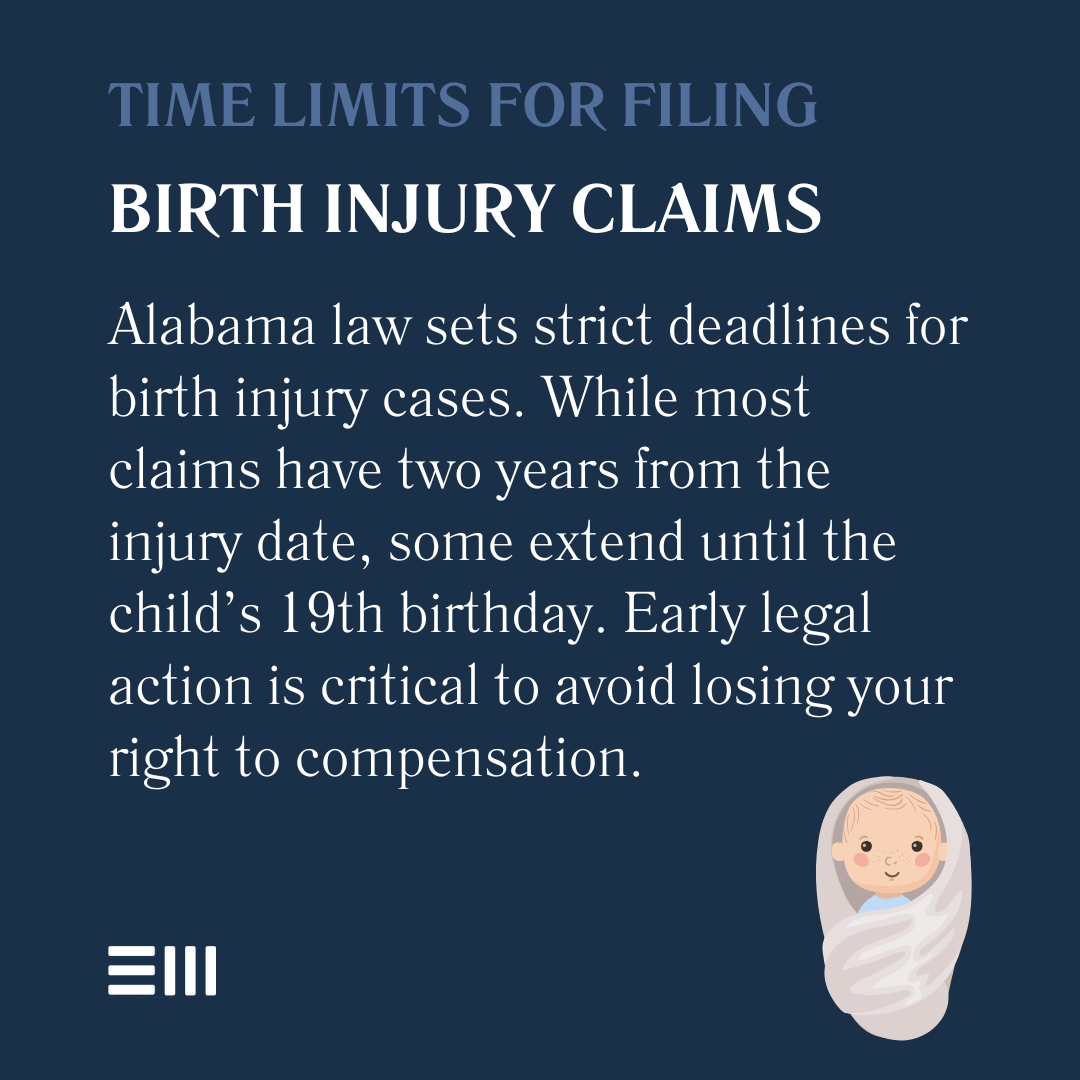The first cry of a newborn should signal joy, not the beginning of a lifetime struggle with preventable injuries. In Alabama delivery rooms, medical decisions made in seconds can forever alter a child's future—from missed signs of fetal distress to delayed emergency interventions.
When healthcare providers fail to meet established standards of care during pregnancy, labor, or delivery, families face not only immediate medical crises but years of specialized care, mounting expenses, and profound emotional challenges.
Understanding your infant's legal rights after a birth injury empowers you to secure the resources necessary for their care and hold responsible parties accountable.
For those dealing with medical malpractice in Alabama, birth injuries represent one of the most devastating forms.
Understanding Birth Injuries vs. Birth Defects
Distinguishing between birth injuries and birth defects forms the foundation of any potential legal claim, as only preventable injuries typically qualify for compensation.
This distinction determines whether medical negligence played a role in your child's condition.
Key differences include:
- Birth injuries: Preventable harm occurring during pregnancy, labor, or delivery due to medical negligence.
- Birth defects: Genetic or developmental conditions arising naturally during fetal development.
- Timing: Injuries happen during the birthing process; defects develop during pregnancy.
- Causation: Injuries result from medical actions or inactions; defects occur naturally.
- Prevention: Proper medical care prevents injuries; defects often cannot be prevented.
- Legal implications: Injuries may warrant compensation; defects typically do not.
Understanding this distinction helps families focus their efforts appropriately and avoid pursuing claims for conditions beyond medical control.
Medical professionals should explain your child's diagnosis clearly, including whether the condition was preventable.

Common Types of Birth Injuries in Alabama
Birth injuries manifest in various forms, each with distinct causes and long-term implications for affected children.
Recognizing these injuries helps families understand their child's condition and potential legal options.
Frequent birth injuries include:
- Cerebral palsy: Brain damage affecting movement and coordination, often from oxygen deprivation.
- Brachial plexus injuries: Nerve damage causing arm weakness or paralysis from delivery trauma.
- Hypoxic-ischemic encephalopathy: Brain injury from insufficient oxygen during birth.
- Facial paralysis: Nerve damage from pressure during delivery or forceps use.
- Fractures: Broken bones, particularly clavicle or arm, from difficult deliveries.
- Intracranial hemorrhage: Bleeding within the skull from trauma or improper delivery techniques.
Each injury type requires specific medical documentation linking the condition to events during pregnancy or delivery.
The severity and permanence of these injuries significantly impact both immediate treatment needs and long-term care requirements.
Establishing Medical Negligence
Proving medical negligence in birth injury cases requires demonstrating that healthcare providers failed to meet accepted standards of care.
Alabama law recognizes that not all adverse outcomes indicate malpractice, making proper evidence essential.
Elements of medical negligence include:
- Duty of care: The healthcare provider had a professional obligation to the mother and infant.
- Breach of duty: The provider failed to meet accepted medical standards.
- Causation: The breach directly caused or contributed to the injury.
- Damages: The injury resulted in compensable harm to the child.
- Foreseeability: A competent provider should have anticipated and prevented the harm.
- Documentation: Medical records support each element of the claim.
Establishing these elements often requires expert medical testimony explaining how proper care would have prevented the injury.
Alabama courts rely heavily on medical expert opinions to distinguish between unavoidable complications and preventable negligence.
Understanding the criteria for personal injury claims helps families build stronger cases.
Time Limits for Filing Claims
Alabama imposes strict deadlines for birth injury claims that differ from standard personal injury cases, recognizing the unique circumstances surrounding infant injuries. Missing these deadlines can permanently bar your right to seek compensation.
Critical time limits include:
- Standard statute: Two years from the injury date for most medical malpractice claims.
- Minor tolling: Claims may be filed until the child's 19th birthday in some circumstances.
- Discovery rule: Limited extensions when injuries aren't immediately apparent.
- Notice requirements: Some defendants require earlier notice of potential claims.
- Medical review: Certain cases require expert affidavit filing with the complaint.
- Government entities: Shorter deadlines apply for claims against public hospitals.
These varying deadlines make early legal consultation essential to preserve your rights. Waiting to see how injuries develop can result in missing critical filing deadlines, leaving families without recourse.
Similar to other legal rights of injured minors in Alabama, birth injury cases have unique considerations.

Steps to Protect Your Infant's Rights
Taking prompt action after discovering a birth injury protects your child's legal rights while ensuring they receive necessary medical care. Each step builds the foundation for potential compensation claims.
Essential protective steps:
- Obtain complete medical records: Request all prenatal, delivery, and postnatal documentation.
- Document the injury: Photograph visible injuries and maintain detailed symptom logs.
- Seek specialist evaluation: Obtain independent medical assessments of your child's condition.
- Preserve evidence: Keep all medical equipment, medications, and related items.
- Maintain expense records: Track all injury-related costs including future care estimates.
- Consult legal counsel: Understand your rights before discussing the case with hospitals.
Following these steps systematically strengthens your position while avoiding common mistakes that could compromise your claim.
Early action also ensures evidence remains available and memories stay fresh.
Frequently Asked Questions About Birth Injury Claims in Alabama
Understanding birth injury claims in Alabama raises important questions for families navigating this challenging situation while caring for an injured infant.
What Compensation Is Available for Birth Injuries?
Alabama law allows recovery for medical expenses, future care costs, therapy, special equipment, educational support, pain and suffering, and lost future earning capacity. Parents may also recover for their emotional distress and care-related expenses.
Compensation aims to provide resources for the child's lifetime needs. Understanding typical personal injury settlement amounts in Alabama helps set realistic expectations, though birth injury cases often involve higher compensation due to lifetime care needs.
How Long Do Birth Injury Cases Take?
Birth injury cases typically take 18-36 months from filing to resolution, though complex cases may take longer. Factors affecting timeline include injury severity, liability disputes, and court schedules. Many cases settle without trial, potentially shortening the process.
Do All Birth Injuries Qualify for Legal Action?
Not all birth injuries result from medical negligence. Some complications occur despite appropriate care. Qualifying cases must demonstrate that different medical decisions or actions would have prevented the injury. Medical experts help determine whether negligence contributed to the injury.
Can I Afford a Birth Injury Lawyer?
Most birth injury lawyers work on contingency fees, meaning they only collect payment if they win your case. This arrangement allows families to pursue justice without upfront costs. Fee structures should be discussed during initial consultations.
What If I Signed Consent Forms?
Consent forms don't waive your rights to competent medical care. These documents acknowledge risks but don't excuse negligence. Healthcare providers must still meet professional standards regardless of signed consents.
These questions address common concerns families face when considering legal action for birth injuries.
Secure Your Child's Future with Experienced Legal Advocacy
Birth injuries shatter expectations and create lifelong challenges that no family should face alone. Your child deserves every opportunity to thrive despite their injury, and Alabama law provides pathways to secure the resources necessary for their care, development, and future.
Whether dealing with immediate medical needs or planning for decades of specialized support, taking action now protects your infant's rights and holds negligent parties accountable.
Our attorneys here at Baxley Maniscalco understand the medical complexities and emotional toll of birth injury cases. We combine compassionate support with aggressive advocacy to pursue maximum compensation for your child's needs.
Our team works with leading medical experts to build compelling cases that demonstrate how proper care could have prevented your child's injury. Contact us today for a confidential consultation about your birth injury concerns.
